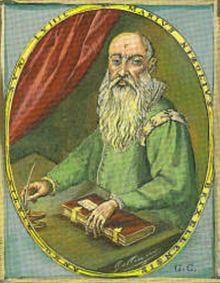Marius Nizolius

Marius Nizolius (
Life
He was born in Brescello. He was professor of philosophy at Parma and Sabbioneta.[4]
Works
His major work was the Thesaurus Ciceronianus, first published in 1535 in Brixen but not under this title, and running into many further editions. It was a lexicon of Latin words used in Cicero's works. It was adopted by Renaissance extremists who considered that writing in Latin could only be correct within this restricted vocabulary.[5] His Antibarbarus philosophicus (original title De veris principiis et vera ratione philosophandi contra psudophilosophos, Parma, 1553) was edited by Leibniz in 1670 with an important Preface.[6] It was a reply in a controversy with Marco Antonio Maioragio (1514-1555),[7] and going back to a dispute from the mid-1540s over the Paradoxes of Cicero.[8]
He died in Sabbioneta.
Notes
- Brian Vickers, In Defence of Rhetoric (1988), p. 181.
- ^ Charles B. Schmitt, Quentin Skinner (editors), Cambridge History of Renaissance Philosophy, p. 734.
- ^ In Richard Popkin (editor), The Pimlico History of Western Philosophy (1999), p. 297.
- ^ Edgar Zilsel, P. Zilsel, Diederick Raven, Wolfgang Krohn, Robert S. Cohen, The Social Origins of Modern Science (2003), p. 26.
- ^ Brian Vickers, English Renaissance Literary Criticism (1999), p. 27.
- ^ Commented German translation by Klaus Thieme, Marius Nizolius aus Bersello: Vier Bücher über die wahren Prinzipien (1980); cfr. also Christia Mercer, Leibniz's Metaphysics: Its Origins and Development (2001), p. 99.
- ^ Cambridge History of Renaissance Philosophy, p. 828.
- ^ Lawrence D. Green, John Rainold's Oxford Lectures on Aristotle's Rhetoric (1986), p. 414.
External links
- Ignacio Angelelli, Nizolius' notion of class (multitudo) (PDF), in Anales de la Academia Nacional de Ciencias de Buenos Aires, XXXV(2), 2001, 575-595.
- (in German) Nizolius, Marius (1498-1566)
